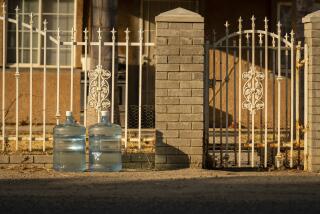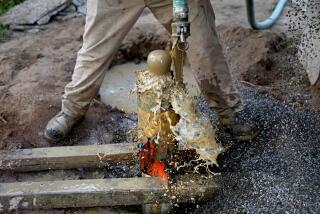Poll finds little support for drought spending despite broad awareness
Most Californians surveyed say the statewide drought has had little or no impact on their daily lives, and a majority oppose the suspension of environmental protections or large-scale public spending to boost water supplies, a new USC Dornsife/Los Angeles Times poll has found.
Although 89% characterize the drought as a major problem or crisis, only 16% say it has personally affected them to a major degree.
Despite widespread news coverage of the drought — one of the worst in recent decades — the state’s major population centers have largely escaped severe mandatory rationing. Even agriculture, which as California’s thirstiest sector is inevitably hit the hardest by drought, has partially compensated for reduced water delivery by pumping more groundwater.
That has softened the drought’s effect on many, apparently blunting the desire for drastic remedies and big spending on water projects.
While Central Valley congressmen and some agribusiness interests have blamed environmental regulations for worsening the water shortages, those polled cited a much broader range of causes. Topping the list was a lack of rain and snow and people using too much water, followed by insufficient storage and climate change.
“They’re really blaming larger forces here,” said David Kanevsky of American Viewpoint, the Republican firm that conducted the opinion survey with Greenberg Quinlan Rosner Research, a Democratic firm. “What they don’t want to see is quick fixes at the expense of the environment.”
The survey showed strong support for water recycling, capturing storm water, increasing storage in underground aquifers, voluntary conservation and seawater desalination. A smaller percentage, though still a majority, favored building new dams and reservoirs.
But when it comes to paying for the projects, the numbers flipped. Only 36% want to improve storage and delivery systems by spending taxpayer dollars.
“As soon as you inject spending into it, support dries up,” said Drew Lieberman of Greenberg Quinlan Rosner.
Pollsters conducted the telephone survey of 1,511 registered California voters from May 21 to May 28 for the USC Dornsife College of Letters, Arts and Sciences and the Los Angeles Times. The margin of error is plus or minus 2.9 percentage points.
A large majority of those surveyed, 87%, said they were trying to save water by taking shorter showers, flushing toilets less frequently and making other changes in their domestic routines. Two-thirds say they are watering their lawns less, and roughly a quarter say they’ve ripped out lawns and replaced them with drought-tolerant plants.
Generally speaking, people in all parts of the state were taking steps to reduce domestic water use. But regional differences surfaced when people were queried about solutions.
Coastal areas favored mandatory 20% cuts in water use more than inland regions. In Southern California, 45% of those surveyed said water rates should be increased to promote conservation, compared with 56% in the Bay Area and slightly less than a third in the Central Valley.
“If they have to raise the price of water … I think it will encourage people to use less of it,” said Erika Hart, 23, a college student who lives in an apartment in Fontana.
A biology major with independent political leanings, Hart also opposed suspending environmental regulations. “I believe we should do more as a community to limit our water usage before we go and affect the wildlife around us,” she said.
The Bay Area had the smallest share of those saying the drought had a major impact — 11% — probably reflecting an urban landscape with some of the lowest per capita water use in the state. But 32% of those in the Central Valley, the state’s agricultural heart, said the drought had a major effect on their lives.
A sharp partisan divide surfaced over the role of climate change, with 78% of Democrats saying it was very or somewhat responsible for water supply problems, compared with 44% of Republicans.
“I don’t believe in climate change,” said Republican Steve Bennett, 60, a contractor who lives in Martinez. “This is a semiarid state. I don’t know when it’s going to sink in — but we have real wet winters and then we have dry periods, and it’s been that way forever.”
Democrats and Republicans differed to a lesser extent on whether environmental protections for fish and wildlife should be suspended in response to water shortages. Overall, 55% of voters said no, as did 56% of Democrats, compared with 45% of Republicans and 64% of those who didn’t align with a party.
Those results suggest a bill passed by the GOP-controlled U.S. House and headed to a House-Senate conference committee is out of sync with a majority of the state’s voters. The legislation would roll back federal fish protections to increase delivery of water in California. But of 11 different water-supply solutions in the opinion survey, easing environmental regulations was the only one opposed by more than 50%.
Photos and newscasts about shrinking reservoirs and dusty cropland have also apparently failed to boost voter willingness to open the public wallet for water projects.
Reluctance to spend taxpayer dollars on water supply was found across the political spectrum. Whether Democratic, Republican or independent, fewer than 40% of those surveyed supported storage and delivery system improvements if they cost taxpayer money.
The numbers are largely unchanged from the results of a USC-Times poll conducted in September that gauged support for state borrowing to finance water-supply improvements. Legislators are now trying to hammer out a water bond to place on the November ballot.
“I think it’s trouble for passing a water bond,” Lieberman said, “if the ‘no’ side spends money” this fall.







